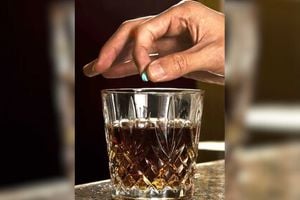
Daniel Maina and David Wamae who died after consuming illicit brew.
When Rahab Wamae said goodbye to her son David on December 18, she had no idea it would be the last time they spoke.
After sharing a meal with the family, David promised to return the following evening after work.
David, 24, ran a barber shop in the Ndege Ndimu shopping centre in Nakuru's Bahati area and lived a short distance from his mother's home.
When he failed to show up as promised, the family assumed he was tied up at work and would probably visit on Friday.
But early on Friday morning, Ms Wamae received an emergency call from her son's neighbour saying that David was unwell.
She rushed to his house and found him in bed, weak and unable to walk or speak. She decided to take him home to monitor his condition.
By Friday evening, David's health had deteriorated and as the family prepared to take him to hospital, he died.
“My son passed on before we could even take him to the Nakuru Teaching and Referral Hospital. We later discovered that he had consumed poisonous illicit brew with two of his friends,” Ms Wamae told Nation.Africa.
David’s father, Peter Ngigi, said he is haunted by their unresolved disagreements.
“The last time I saw him was Wednesday night when he came home for dinner. When he left that night, we were not on good terms. What pains me more is that we never resolved our differences,” he said.
“He was a hardworking young man. We have lost three industrious men in our village to alcohol. We call upon the government to intensify the fight against illicit brew. Those who sell it do not care about our children, only for money.”
As the Wamae family mourned, news emerged that David’s two friends – Stephen Mwangi, 41, and Daniel Maina, 37 – had also consumed the brew.
Both were rushed to Nakuru Teaching and Referral Hospital by their families, but succumbed to the poisonous drink.
Maina's mother, Jane Mureithi, described the harrowing events that led to her son's death.
“He arrived home late on Thursday, around 10pm. He was drunk, but when I confronted him he denied it. The next morning he woke up complaining that he couldn’t see. At first I thought he was joking, but when he started crawling and shouting for help I knew it was serious,” Ms Mureithi said.
She took him to an eye clinic where the doctors recommended he be admitted to a general ward. But on Saturday she received a devastating phone call telling her that her son had died.
“There is nothing to celebrate this Christmas. I have lost my breadwinner to the killer brew we have been fighting so hard to eliminate. Despite his age, my son had no wife or children; he lived alone. I had tried to convince him to stop drinking...now he is no more,” she said.
For Mwangi’s family, the story was eerily similar.
His mother, Dinah Wambui, said her daughter had called her on Friday morning, crying that Mwangi was unwell and needed urgent medical attention. The family struggled to find transport and managed to get him to hospital.
“Just like Maina, we had warned him about his drinking habits but he never listened,” Ms Wambui said, her voice breaking.
On Monday, Nakuru North Sub-County Police Commander Lilies Wachira confirmed the deaths and said investigations were underway into the source of the illicit brew. On Sunday, she led a public baraza with Bahati residents to gather information about the incident.
“One of the deceased is believed to have purchased the brew on Thursday night and shared it with his friends. As of now, no other victims have come forward to report similar symptoms or assist with the investigation,” Ms Wachira said.
The tragedy has reopened wounds for the Bahati community, which suffered a similar incident on August 9, 2021. That year, 10 people died from poisoned illicit brew in Hodi Hodi, a neighbouring area.
The revellers complained of severe stomach pains, dizziness and vomiting after a night of drinking. Three people died that morning and the death toll rose to ten in the following days.
The dead included the vendor of the brew and an expectant mother who went blind before succumbing. Post-mortems revealed that the victims had been poisoned.
The then Rift Valley Regional Commissioner George Natembeya led a crackdown on illicit brewing, with residents helping to destroy several illegal liquor dens.
Nine government officials from Bahati were arrested in a move to curb the sale of illicit brew, including chiefs, their assistants, the deputy county commissioner and the sub-county police commander.
But since the crackdown, the business of death has returned, leaving families devastated and the community in fear despite the celebrations.







